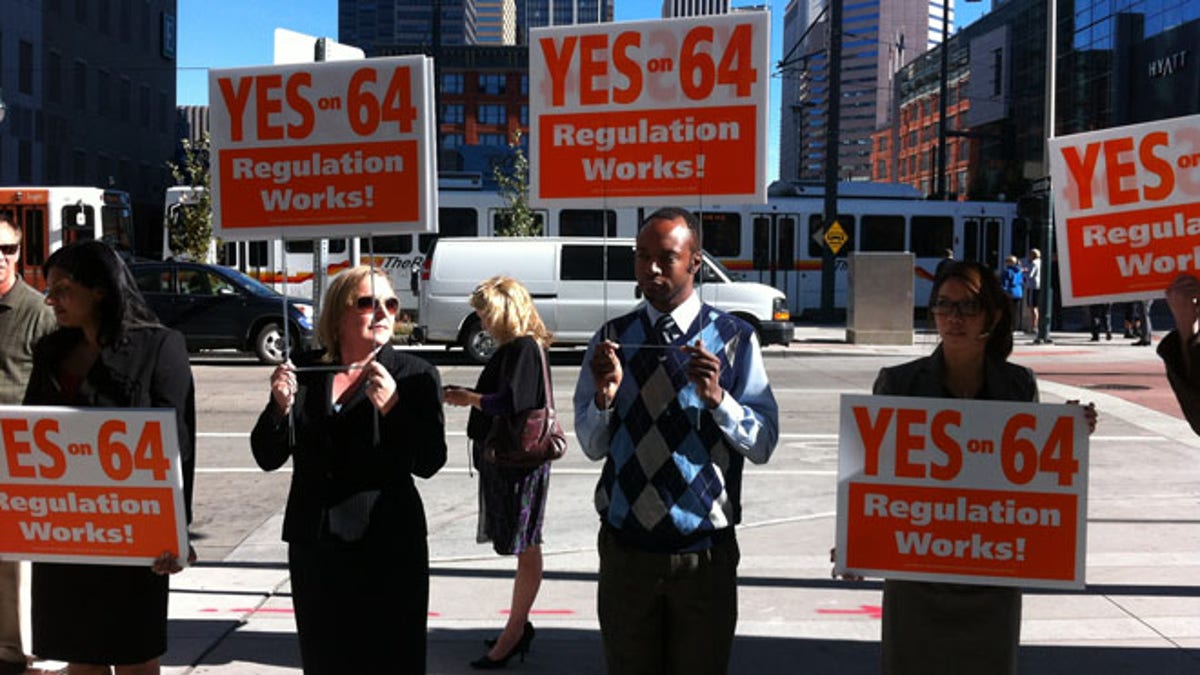
Oct. 15, 2012: Demonstrators in Denver hold signs in support of Amendment 64, a ballot measure that would partially legalize marijuana. (FNC)
The swing state of Colorado stands to make history and headlines if voters approve Amendment 64 on Election Day -- a proposed change to the state Constitution that would allow adults 21 and over to use and possess marijuana in limited amounts.
Denver's mayor says it threatens to make the Mile High City the "marijuana capital of the country." Mayor Michael Hancock says it cannot be good for financial progress.
"This amendment is going to be very costly and will cost us jobs," Hancock said. "It will cost us our reputation as a nation, a state and a city that is growing merging and creating jobs, but also is a destination, convention destination around the world."
Colorado is hardly alone, though, in the push to partially legalize pot. Two other states, Oregon and Washington, are holding similar marijuana legalization votes next week.
People pushing for the legalization in Colorado have launched a full-scale campaign for the measure. And in interviews with Fox News, they pointedly worked references to "prohibition" into their pitch.
"Those who have studied up on alcohol prohibition will remember very few elected officials supported the repeal of alcohol prohibition, but once alcohol prohibition was repealed, it was widely recognized as a failed policy and I believe the same will be the case for marijuana policy," said Betty Aldworth, advocacy director of the Campaign to Regulate Marijuana Like Alcohol.
Aldworth counters criticism that the measure would hurt Colorado's healthy image. "Our governor or other elected officials are perfectly happy to tout Colorado's dozens of microbreweries and very entrenched alcohol culture and I don't see what the difference is there," she said.
She's referring to popular governor and Democrat, John Hickenlooper, who made his fortune in the restaurant and beer business before moving to politics. Hickenlooper has sided with a coalition of elected officials business leaders who are against the marijuana proposal. His office put out a news release saying in part, "Amendment 64 has the potential to increase the number of children using drugs and would detract from efforts to make Colorado the healthiest state in the nation. It sends the wrong message to kids that drugs are OK."
Aldworth argues A-64, as it's known, would create a regulated market. "The underground market is entirely pervasive at this point and there is no control over who is able to access marijuana through that underground market. By taking marijuana off the streets and putting it behind the counter we can more easily keep it out of the hands of our youth."
The last major poll showed support tightening. The push for legalization started with the lead but has since fallen below the important benchmark of 50 percent.
Independent political analyst Eric Sondermann, who runs the firm SE2 specializing in public issues and opinion, said the proponents have money for television ads which are "very pleasant, very simple and very much not about marijuana."
"They're about the tax revenues," he said. "They're about schools and everything else you could do with the tax revenues. It's a very, very soft sell and I think in that way fairly effective."
For weeks, both sides have held dueling events to draw attention to the debate. Votes to pass or not pass A-64 could be in the bag. As of Nov. 2, more than 1.5 million Coloradans had cast ballots through early voting or mail-in ballots.




